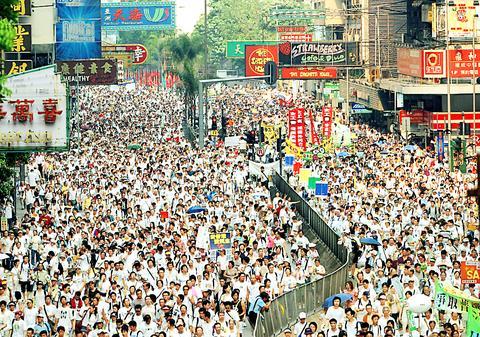Hundreds of thousands of people in white shirts poured onto the streets of Hong Kong yesterday to vent their frustration at Chinese rule and challenge Beijing's refusal to allow them to elect their own leaders.
Waving green and black banners and carrying umbrellas to shield them from the blazing sun, protesters chanted "Return power to the people, fight for democracy" as they streamed through the urban canyons of the shopping district to government offices in the heart of the city kilometers away.
"I am here to tell Beijing that we want democracy, we want to elect our own chief executive," said construction worker Chan Sum-kee, 54, like many others protesting for the first time.

PHOTO: EPA
The main organizer, the Civil Human Rights Front, said two hours into the march some 350,000 people had taken part -- 50,000 above the expected turnout. The government provided no numbers.
A large turnout signaling dissatisfaction could embarrass Chinese leaders and heighten Communist Party fears about losing political control of Hong Kong.
Beijing also worries that demands for more democracy could spill over to China and undermine their one-party rule.
Pro-democracy politicians will try to wrest control of Hong Kong's top lawmaking body from pro-China supporters in legislative elections in September.
Comments yesterday suggested that many Hong Kong people were looking ahead to those polls.
A chambermaid at one of Hong Kong's top hotels along the route said she regretted not being able to join the march, and added: "Even though I can't be there today marching, I will certainly make my feelings known at the election."
Police said there were no disturbances but the intense heat took its toll, with at least one person believed to have suffered heat stroke as temperatures topped 34?C.
The demonstration, timed to coincide with the seventh anniversary of the former British colony's return to China, gave Beijing a taste of what they fear most, a mass show of public dissent.
But leading pro-democracy activists were quick to stress that what Hong Kong people wanted was more freedom under Chinese rule, not independence.
"We are here today to fight for democracy," veteran campaigner Martin Lee (李柱銘) said. "Not a single person here wants independence."
The white T-shirts symbolized hopes that China would one day offer the city greater democracy and freedoms. Other messages were more blunt.
"Hong Kong people's demands are being raped," one placard read.
Retirees and mothers carrying young children marched alongside protest veterans, highlighting the depth of feeling in favor of direct elections and dissatisfaction with China's hand-picked Chief Executive Tung Chee-hwa (董建華).

MAKING WAVES: China’s maritime militia could become a nontraditional threat in war, clogging up shipping lanes to prevent US or Japanese intervention, a report said About 1,900 Chinese ships flying flags of convenience and fishing vessels that participated in China’s military exercises around Taiwan last month and in January have been listed for monitoring, Coast Guard Administration (CGA) Deputy Director-General Hsieh Ching-chin (謝慶欽) said yesterday. Following amendments to the Commercial Port Act (商港法) and the Law of Ships (船舶法) last month, the CGA can designate possible berthing areas or deny ports of call for vessels suspected of loitering around areas where undersea cables can be accessed, Oceans Affairs Council Minister Kuan Bi-ling (管碧玲) said. The list of suspected ships, originally 300, had risen to about 1,900 as

Right-wing political scientist Laura Fernandez on Sunday won Costa Rica’s presidential election by a landslide, after promising to crack down on rising violence linked to the cocaine trade. Fernandez’s nearest rival, economist Alvaro Ramos, conceded defeat as results showed the ruling party far exceeding the threshold of 40 percent needed to avoid a runoff. With 94 percent of polling stations counted, the political heir of outgoing Costa Rican President Rodrigo Chaves had captured 48.3 percent of the vote compared with Ramos’ 33.4 percent, the Supreme Electoral Tribunal said. As soon as the first results were announced, members of Fernandez’s Sovereign People’s Party

MORE RESPONSIBILITY: Draftees would be expected to fight alongside professional soldiers, likely requiring the transformation of some training brigades into combat units The armed forces are to start incorporating new conscripts into combined arms brigades this year to enhance combat readiness, the Executive Yuan’s latest policy report said. The new policy would affect Taiwanese men entering the military for their compulsory service, which was extended to one year under reforms by then-president Tsai Ing-wen (蔡英文) in 2022. The conscripts would be trained to operate machine guns, uncrewed aerial vehicles, anti-tank guided missile launchers and Stinger air defense systems, the report said, adding that the basic training would be lengthened to eight weeks. After basic training, conscripts would be sorted into infantry battalions that would take

GROWING AMBITIONS: The scale and tempo of the operations show that the Strait has become the core theater for China to expand its security interests, the report said Chinese military aircraft incursions around Taiwan have surged nearly 15-fold over the past five years, according to a report released yesterday by the Democratic Progressive Party’s (DPP) Department of China Affairs. Sorties in the Taiwan Strait were previously irregular, totaling 380 in 2020, but have since evolved into routine operations, the report showed. “This demonstrates that the Taiwan Strait has become both the starting point and testing ground for Beijing’s expansionist ambitions,” it said. Driven by military expansionism, China is systematically pursuing actions aimed at altering the regional “status quo,” the department said, adding that Taiwan represents the most critical link in China’s